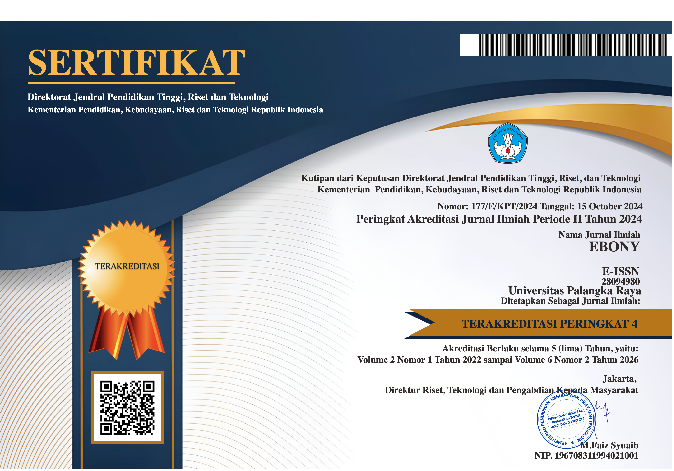Exploring Thematic Progression of EFL Students’ Argumentative Essays
DOI:
https://doi.org/10.37304/ebony.v4i2.13676Keywords:
argumentative essays, coherence, thematic progression patterns, SFLAbstract
This paper aims to investigate the thematic progression patterns in students’ argumentative essays produced by Tunisian EFL learners. The data originated from 27 academic essays written by second year Business English students were collected, investigated and interpreted employing a qualitative approach with descriptive analysis relevant to thematic progression patterns based on the theory proposed by Bloor and Bloor (2004). The preliminary results suggested the students’ predominant use of the constant pattern which implies that they are successfully able to ensure smooth information flow in their writings. Besides, the thematic analysis revealed the presence of the linear pattern, which proved the writers’ ability to maintain the essays’ cohesion by introducing new information and making a Rheme to become the Theme of the next clause. However, the results demonstrated the low presence of the split-rheme pattern and the total absence of the derived theme in the students’ argumentative essays, which indicates their limited writing skills in creating, developing, and connecting complex clauses. This study intends to provide contributive insights that may help EFL and ESL instructors as well as curriculum designers to enhance the students’ textual coherence as well as their academic writing proficiency.Downloads
References
Bloor, T. & Bloor, M. (2004). The Functional Analysis of English. Oxford University Press.
Butt, D. (2000). Using Functional Grammar: An Explorer’s Guide (2nd edition). Sydney NSW Australia: Macquarie Univ.
Creswell, J. W. (2009). Research Design: Qualitative, Quantitative, and Mixed Methods Approaches (3rd ed.). Thousand Oaks, CA: Sage Publications.
Crompton, P. (2004). Theme in discourse: ‘Thematic progression’ and ‘method of development’ re-evaluated. Functions of language, 11(2), 213-249.
Danes, F. (1974). Functional sentence perspective and the organization of the text. In F. Danes, ed. Papers on Functional Sentence Perspective (106-128). Prague: Academia /The Hague: Mouton.
Downing, Angela. (2001). Thematic Progression as a Functional Resource in Analysing Texts. Círculo de lingüística aplicada a la comunicación, ISSN 1576-4737, Nº. 5, 2001.
Eggins, S. (1994). An Introduction to Systemic Functional Linguistics. London: Biddles Ltd.
Eggins, S. (2004). An Introduction to Systemic Functional Linguistics (2nd ed.). London: Continuum.
Emilia, E. (2005). A critical genre-based approach to teaching academic writing in a tertiary EFL context in Indonesia (Unpublished Dissertation). The University of Melbourne, Melbourne. Retrieved from https://minervaaccess.unimelb.edu.au/handle/11343/39548
Enkvist, N. E. (1974). Style and Types of Context. Reports on Text Linguistics: Four Papers on Text, Style and Syntax.
Februana, D. M. (2014). Thematic development of narrative writings of third semester students of english department of ikip pgri semarang (Doctoral dissertation, Diponegoro University).
Fries, P. H. (1995). Themes, methods of development, and texts. Amsterdam studies in the theory and history of linguistic science series 4, 317-360.
Fries, P. H., & Francis, G. (1992). Exploring theme: Problems for research. Occasional Papers in Systemic Linguistics, 5, 45-60.
Haji, G. (2023). SFL-based analysis of thematic progression of English graduate personal statements. LLT Journal: A Journal on Language and Language Teaching, 26(2), 440-453.
Halliday, M. A. K., & Hasan, R. (1976). Cohesion in English. English Language Series, London: Longman.
Halliday, M. A. K., & Matthiessen, C. M. M. (2014). Halliday’s introduction to functional (Vol. 17, No. 1, p. 72). Routledge.
Halliday, M.A. (1985) Spoken and Written Language. Deakin University, Waurn Ponds.
Halliday, M.A. K. (1968). "Notes on transitivity and theme in English," Journal of Linguistics 4:179-215.
Hawes, T. (2015). Thematic progression in the writing of students and professionals. Ampersand, 2, 93-100.
Hawes, T., & Thomas, S. (1997). Problems of thematisation in student writing. RELC journal, 28(2), 35-55.
Jalilifar, A. (2010). Thematization in EFL students’ composition writing and its relation to academic experience. RELC Journal, 41(1), 31-45. https://doi.org/10.1177/0033688210362616
Jannah, M., Fitri, Z., & Nurjannah, N. (2023). IPAD Implementation in Teaching English at SMP Islam Al-Azhar Cairo Banda Aceh. Journal of English Teaching and Linguistics, 4(1), 49-56.
Jing, W. (2015). Theme and Thematic Progression in English Writing Teaching. Journal of Education and Practice, 6(21), 178-187.
Keskin, D., & DEMİR, B. D. K. (2021). The role of theme and rheme in thematic progression patterns in English argumentative essays by Turkish University students. Edu 7: Yeditepe Üniversitesi Eğitim Fakültesi Dergisi, 10(12), 64-82.
Leong, P. A. (2019). Visualizing texts: a tool for generating thematic-progression diagrams. Functional Linguistics, 6, 1-13.
Maharani, P., Yassi, A. H., & Rahman, F. (2022). English Linguistics Theory for subtype complementary feature in comparison to Javanese Linguistics. AMCA Journal of Community Development, 2(2), 42-47.
Matthiessen, C. M. (2020). Translation, multilingual text production and cognition viewed in terms of systemic functional linguistics 1. In The Routledge handbook of translation and cognition (pp. 517-544). Routledge.
McCabe, A. M. (1999). Theme and thematic patterns in Spanish and English history texts (Doctoral dissertation, University of Aston in Birmingham).
Nwogu, K. N. (1991). Structure of science popularizations: A genre-based analysis approach to the schema of popularized medical texts. English for Specific Purposes, 10, 111- 123. https://doi.org/10.1016/0889- 4906(91)90004-G
Okta, Z., Ashadi, A., Triyono, S., & Pranowo, D. D. (2023). Thematic Structure in Students’ Writings: Implications on their Ideas Organization and Development. Register Journal, 16(1), 49-72.
Oliver, V. (2010). 301 Smart Answers to Tough Business Etiquette Questions. Skyhorse Publishing: New York, USA.
Ostrom, J., & Cook, W. (1993). Paragraph Writing Simplified. New York: HarperCollins College Publishers.
Ozdemir, S. (2018). The Effect of Argumentative Text Pattern Teaching on Success of Constituting Argumentative Text Elements. World Journal of Education, 8, 112-122. https://doi.org/10.5430/wje.v8n5p112
Paltridge, B. (2012). Discourse analysis: An introduction (2nd ed.). Bloomsbury Publishing.
Pavavijarn, S. (2022). Influences of Thematic Progression on Quality of EFL Argumentative Writing. LEARN Journal: Language Education and Acquisition Research Network, 15(1), 282-319.
Ping, A. L. (2007). Developing the Message: Thematic progression and student writing. Journal of Asia TEFL, 4(3).
Safitra, Z. (2013). Theme system of systemic functional grammar in students' narrative texts (Unpublished master thesis). Universitas Pendidikan Indonesia, Bandung.
Schmitt, N. (2002). Vocabulary Learning Strategies. In N. Schmitt, & M. McCarthy (Eds.), Vocabulary: Description, Acquisition and Pedagogy (pp. 199-227). Shanghai Foreign Language Education Press.
Setyarini, S., Ling, M. A., & Narita, F. (2016, November). Teachers' Difficulties and Strategies in Developing Narrative Texts as Learning Materials for Young Adolescent Regarding to Theme System. In Ninth International Conference on Applied Linguistics (CONAPLIN 9) (pp. 199-202). Atlantis Press.
Sharndarma, E. C., & Panamah, J. H. (2013). Thematic Structure and Progression in Selected Business News Reports of Two Nigerian Newspaper: Implications for Professional Writing. Journals of Arts and Humanities, 2(7), 72-81. DOI: https://doi.org/10.18533/journal.v2i7.167
Styati, E. W., & Rodliyah, R. S. (2021). Investigating the writing quality of students with different proficiency levels in interaction-based pair works. Indonesian Journal of Applied Linguistics, 11(1). https://doi.org/ https://doi.org/10.17509/ijal.v11i1.34659
Varela, J. R. (2014). Comparative Corpus Linguistics: The Study of Current Grammatical Changes in English. Comparative Corpus Linguistics: The Study of Current Grammatical Changes in English, 71-82.
Wang, L. (2007). Theme and rheme in the thematic organization of text: Implication for teaching academic writing. Asian EFL Journal, 9(1), 164-176.
Wei, J. (2016). Theme and thematic progression in Chinese College Students’ English essays. Singapore: Springer.
Williams, B. (2009). The sense of the past: Essays in the history of philosophy. Princeton University Press.
Yani, N. A., Suwarno, B., & Hati, G. M. (2019). An Analysis of Thematic Progression In The Background Section Of English Department Undergraduate Students’ Thesis Of Bengkulu University In Period 2017. Journal of English Education and Teaching, 2(4), 9–14. https://doi.org/10.33369/jeet.2.4.9-14
Yunita, S. (2018). Theme and thematic progression in students’ recount texts. Indonesian Journal of Applied Linguistics, 7(3), 524-530.
Downloads
Published
How to Cite
Issue
Section
License
Copyright (c) 2024 Ghada Haji

This work is licensed under a Creative Commons Attribution 4.0 International License.











